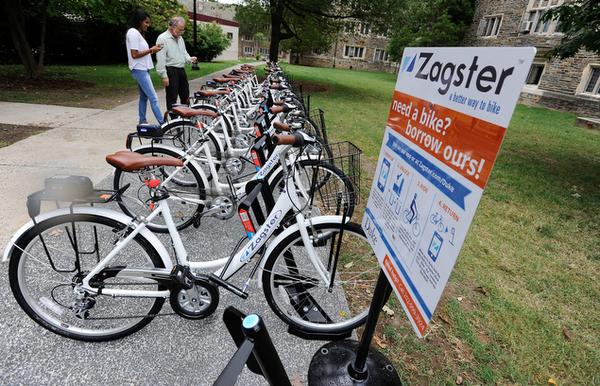Transportation Demand Management (TDM) is the application of policies, programs, information, services, and tools that work with the transportation infrastructure and operations to increase efficiency of the transportation network and reduce congestion on roadways at peak traffic times. Strategies may include employer incentives to utilize alternative forms of transportation (e.g., carpooling, walking, or biking), teleworking or flexible schedules, locating employees at an office closer to home and/or educational/marketing materials to educate residents about available public/alternate transportation options to commute.
Why is this important to your community?
Air quality compliance is an ongoing issue for the CONNECT region, as vehicular traffic grows and air quality standards become more rigorous to support public health. Reliance on automobiles and the distance between complementary land uses has contributed to an increase in air pollution, vehicle miles traveled (VMT), commuting, and the cost of providing infrastructure. As the region continues to grow, utilizing transportation demand management is one tool municipalities and employers can employ to mitigate air pollution, reduce energy consumption and VMT during associated with commuting, and help reduce the need for extensive investments in infrastructure.
Skip directly to
How Does It Work?
Resources
Using the Tool
Partners
Where Has It Worked?
Where is it appropriate to use?
What priorities does it address?
What other tools are related?
- Capital Improvements Programming
- Newcomer Community Resource Guide
- Growth Management and Cooperation
- Creative Public Finance
- Land Use Modeling
- Return on Investment
- Mixed Use Development and Design Guidelines
- Regional Cooperation
How does it work?
There are several ways to apply the transportation demand management tool. Within the CONNECT region, the Councils of Government have already started to set the stage for a regional TDM program, working on integrating CommunityViz data with Regional Travel Demand Models. Regionally administered TDM programs, such as Triangle Transit Authority’s (which involves the Triangle Region’s two Metropolitan Planning Organizations and the NC Department of Transportation pooling their funds to have a competitive call for TDM projects), are an efficient way to coordinate marketing efforts and funds across multiple jurisdictions, transit providers, and constituents. Regional programs make it possible to coordinate trips and provide transportation services and incentives for demand reduction across county lines, an important consideration in a region such as the CONNECT region’s, in which 51% of commuters cross a county line for work. Regional programs also may have access to more funding sources to support TDM incentives and coordination activities across boundaries.
For their part, municipalities can develop and promote programs to encourage commuters to carpool or vanpool from a park and ride location, fund new multi-use trails that link neighborhoods to employment centers, or improve the availability of public transportation. Employers can sponsor incentive programs to encourage employees to utilize alternative modes of transportation. Possible incentives include reduced cost of parking for carpoolers, reward programs, bike parking and facilities, federal tax benefits, or direct subsidies for using public transportation. Employers may also offer a way for employees interested in carpooling to connect through a matching program. In addition to transportation-related strategies, some employers may be able to provide the opportunity for employees to telework, offer condensed/non-peak work hour schedules, or locate employees at an office closer to home. Teleworkers often work from home; however they may also work from remote locations like shared office spaces, clients’ offices, coffee shops and other locations. Yet others, sometimes called "nomad workers," use mobile telecommunications technology to work while “on the road.”
Resources
- CONNECT our Future, Regional Scan Document, 2013
- Employee Trip Reduction Resource Book – San Joaquin Valley, Air Pollution Control District
- Commute Connection – Links employers and commuters to incentives and programs
- Triangle COG Transportation Demand Management Program
- North Carolina DOT Travel Demand Management Program
Ready to get started?
Using the Tool
- Convene a group of regional leaders (transportation, economic development, environmental, and major employers) to discuss ways to reduce commuting costs, VMT, and air pollution through a regional TDM approach.
- Provide information to support discussion
- Seek consensus for consideration by policy-makers
- Upon approval by key policy-makers, proceed with planning for regional TDM program, in collaboration with representatives from each county that wishes to be involved, and including major regional employers who draw workers from multiple counties
- Convene a group of local government representatives (transportation, economic development, environmental, etc.) and local employers to bring the discussion down to the local level
- Consider what is feasible/doable considering local land use patterns, resources, and commuter needs
- Discuss integration of local needs with regional efforts. What aspects of local need can be addressed through regional efforts, and what aspects must be addressed locally?
- Determine what set of transportation demand management strategies is best suited for local implementation, and how they will integrate with regional efforts.
- In rural areas, employers may offer teleworking, flexible schedules, or rideshare programs to employees to reduce commuting time and cost.
- In more developed areas, employers may provide subsidized public transportation passes, incentives or facilities for bicyclers, or discounted parking for employees who carpool.
- It may be desirable to reach out to one or more large employers (e.g, university, hospital, or factory) to test a pilot project, whether working at the regional or local level.
- This could be a rideshare program, incentives to take public transportation (see Fare-Free Transit), or the installation of bike storage and facilities for commuters.
- If a pilot project is used, share and celebrate the results with other large employers.
- Consider backing public sector transportation demand management efforts. This could include supporting multi-use trail projects, promoting existing or proposed subsidies and tax credits for utilizing alternate forms of transportation, or expanding public transportation systems to provide more residents with commuting options.
- Ensure that employees throughout the region and your community are aware of incentives offered by individual employers and municipal, state, or Federal governments. Create a guide to commuting options and incentives available in print and online for employers and employees.
Partners
- Airports
- Businesses / Business Associations
- Economic Development Organizations
Where has it worked?
Charlotte Area Hotel Association (CAHA) Discounted Bus Pass Program - Charlotte, NC
 Image Source: Charlotte Area Hotel Association.
Image Source: Charlotte Area Hotel Association.
Contact
Sid Smith, CAHA Executive Director
704-588-3255
charlottehotels@aol.comAbout the Program
CAHA represents some of the largest hotels doing business in the city of Charlotte, North Carolina. CAHA was created in 2002, partly in response to an invitation to participate in a program sponsored by the Charlotte Area Transit System (CATS). The Employment Transportation Coordinator (ETC) program allows eligible hotels to purchase and provide bus passes to their employees at a 20 percent discount. CAHA is the conduit for the program, purchasing bus passes from CATS as an entity itself and distributing them to the hotels, which in turn make them available to their employees. Purchases made by CAHA generate approximately $6,000 a month in savings for between 530 and 550 hotel employees. CAHA coordinates monthly purchases for participating hotels, distributes the passes directly to HR staff at each hotel, and manages all the accounting and administration activities, saving the hotels valuable staff time and money. Each hotel then makes the passes available to workers, either through payroll deductions or by reselling them at the discounted rate.
Why it works
CAHA allows smaller hotels in Charlotte to purchase discount bus passes from the local transit provider and in turn, pass the savings onto workers and their families. CAHA manages all administrative functions, saving individual hotel members staff time and expense. Access to the passes ensures that employees have a safe and reliable alternative to get to work, while contributing to decrease the number of vehicle trips, lower emissions and reduce congestion. At the same time, hotel employees receive a substantial discount on transportation costs; can purchase the same discounted passes for other family members; and save money on operating, maintaining and parking a vehicle.
A CATS representative routinely attends CAHA meetings to update members on changes in mass transit and other ETC-related issues. The briefings also provide an opportunity to make suggestions and address any questions hotel management may have about the ETC program. In addition, CATS staff often reference and/or bring literature that can be distributed to employees.
Upon a recommendation from CAHA, CATS developed a bilingual wall poster for the hotels to mount in employee lounges. The poster encourages employees to look into participating in the bus pass program by stating that discount bus passes are available via the hotel’s HR Department, and includes information on the amount of the discount. CATS also supplies updated route maps and other promotional materials for the hotels to distribute along with the passes each month.
Duke University - Durham, NC
About the Program
In 2007, Duke University created a Campus Sustainability Committee to develop strategies to reduce the environmental impact of its students and campus. The Committee helped develop a Climate Action Plan to guide the University and its 30,000 employee and 13,000 students in achieving carbon neutrality by 2024. As part of the University’s commitment to sustainability, Duke offers a variety of incentives for staff, faculty, and students who commute to campus utilizing an alternative mode of transportation.
Why it works
The University offers a variety of alternative ways to commute to campus. This includes carpooling, vanpooling, taking city or regional transit, bicycling, carshare programs, or telecommuting. Students and employees who carpool with 4 or more individuals are given free parking on campus and two daily parking passes per month. Those who carpool with 2 or 3 individuals pay a discounted fee to park on campus. In an effort to reduce commuting costs for employees, Duke partnered with Triangle Transit to start a vanpool program. Triangle Transit provides the van, pays for gas and insurance, and maintenance in return for a nominal fee from participants (seven per van). In an effort to increase the number of Duke students and employees utilizing Triangle Transit’s bus routes, Duke offers a GoPass. GoPass is a subsidized transit pass that gives cardholders unlimited rides on local and regional buses. Bicycle commuters can register and receive two free daily parking passes per month, discounts at local retailers through Bicycle Benefits (a national incentive program), and access to shower facilities at both University gyms. Zagster, a bike share program, is located on campus. The service allows participants to rent bikes for free for the first 3 hours, $2 for every hour after with a maximum fee of $10. Enterprise CarShare cars are located on campus to provide students and employees with convenient access to cars when necessary. In addition to traditional transportation incentives, Duke offers employees, when appropriate, the option to telecommute.
http://parking.duke.edu/commuting/vanpool.php
http://parking.duke.edu/commuting/carpool/index.php
http://parking.duke.edu/commuting/
- Businesses / Business Associations
- Newcomer Community Resource Guide



